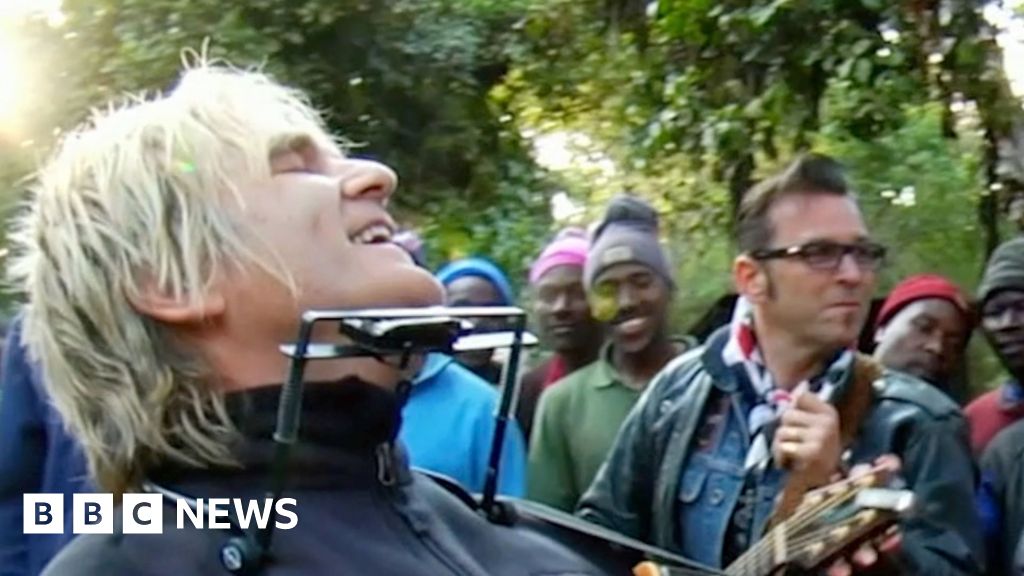ARTICLE AD BOX
By Mark Savage
BBC Music Correspondent
Image source, Simon Emmett
Image caption,30 is the Tottenham-born singer's first album in six years
"Why would I shake up my sound?" asked Adele in an interview with The Face this week. "No one else is doing my sound, so why would I change it up?"
It's a fair question. Adele's sound - a combination of classic soul and polished, confessional pop - has propelled her into the stratosphere. Her albums sell tens of millions of copies, at a time when many of her peers struggle to sell a million. Her interview with Oprah Winfrey last weekend was watched by more people than the Oscars or the Grammys. Why fix what isn't broken?
Which is why Easy On Me, the first single from Adele's new album, 30, was the musical equivalent of a TV show recap... "Previously on Adele". A blustery, heartbroken ballad, it served as a reintroduction to the star's immaculate voice after six years' absence.
What we didn't know is that it was paving the way for an album that takes more risks than you'd expect.
Warning: Third party content may contain adverts
30 is the first record she has released since the collapse of her marriage, and many of the songs bear the hallmarks of late, sleepless nights as she grapples with the consequences of ripping her life apart.
Her interviews on the subject have been elliptical. Adele takes responsibility for the break-up, but the cause is hard to grasp... possibly even to her. There were no fights, no screaming, no infidelities, she says, just a slow realisation that she was "really not happy".
The album dwells on that unspoken, unidentifiable sadness. Adele often sounds emotionally bewildered as she stumbles around the debris of her life.
"I created this storm / It's only fair I have to sit in its rain," she sings on Cry Your Heart Out. "I can't get no relief, I'm so tired of myself/ I swear I'm dead in the eyes/ I have nothing to feel no more/ I can't even cry."
The song is more jaunty than those lyrics suggest, delivered with a girl group swagger and playful, semi-discordant backing vocals that sound like a dodgy VHS recording of the Andrews Sisters.
Image source, Columbia Records
Image caption,The star's previous album, 25, sold more than 22 million copies worldwide.
She's on similar lyrical territory for the album's centrepiece, Hold On: "Every day feels like the road I'm on / Might just open up and swallow me whole / How do I feel so mighty small/ When I'm struggling to feel at all?"
She restrains from belting these lines out with her usual, leonine force, finding delicate new tones that double down on the song's devastating emotional impact.
By the closing moments, though, she's singing at full blast, accompanied by a gospel choir and delivering some hard-won truths.
"Sometimes loneliness is the only rest we get/ And the emptiness actually lets you forget... So hold on/ Just be patient."
As Oprah suggested in an interview with CBS News, marriage counsellors are going to hate this song.
"She's going to liberate a lot of people in marriages that no longer work," said the US chat show host. "So many people stay for the children, making themselves miserable, then the children grow up with a miserable mother.
"She said she wanted to present a happy person to her son."
Watch Adele tell Oprah Winfrey how she coped following mental health struggles
Adele has said that 30 is an attempt to explain her divorce to her son Angelo, and the third track incorporates some extraordinary clips of her talking to the nine-year-old about the break-up.
"Mummy's been having a lot of big feelings lately," she tells him in what, presumably, is a voice memo captured on her phone. "I feel a bit confused and I feel like I don't really know what I'm doing."
It makes for uncomfortable listening, which might just be the point. The song's self-lacerating lyrics address Adele's guilt over exposing her son to the trauma of divorce. She's not letting herself off the hook here - or anywhere else, for that matter.
The lyrics are full of home truths and tough questions. The closest she comes to settling scores is on the acoustic guitar-driven Woman Like Me, her fangs on display as she excoriates a man who refuses to put her first.
"Complacency is the worst trait to have," she chides. "It is so sad a man like you could be so lazy."
The sequencing of that song is significant. It comes towards the end of the album, where Adele starts making overtures towards finding love again - the suggestion being it's not about her ex, Simon Konecki, with whom she is still on good terms.
Image source, Columbia Records
Image caption,Adele said she considered not releasing the record
There are moments of levity on the album, too, acting as much-needed palate cleansers amidst all the sorrow.
All Night Parking is an intoxicatingly sleepy romance, sung over a piano improvisation by the late Erroll Gardner.
Elsewhere, pop overlord Max Martin drops in to produce Adele's first booty-call anthem, Can I Get It?
A Frankenstein's monster of pop genres, it stitches the bluegrass stomp of Rolling In The Deep to a surprisingly funky chorus and - for no good reason at all - a whistled refrain. It's utterly bonkers, and the most carefree she's ever sounded.
But the real highlight is I Drink Wine. A fan favourite based on the title alone, there was a feverish expectation it might be a Chardonnay-based remake of Born Slippy. Instead, it's a barnstorming, 11 o'clock ballad that contains some of the album's bleakest lyrics.
"They say to play hard, you work hard, find balance in the sacrifice / And yet I don't know anybody who's truly satisfied".
Starting off in Elton John / Carole King territory, it eventually erupts in a display of vocal pyrotechnics and sustained notes neither of those singers could ever pull off. It's the album's best track, and one of Adele's best-ever vocals. (She outdoes herself on the penultimate track, To Be Loved, but the song itself is too drab to become a classic).
Warning: Third party content may contain adverts
Adele has resisted the classification of this record as a "divorce album". If anything, she said, it's about becoming divorced from, and then rediscovering, herself.
"I feel like this album is self-destruction," she told British Vogue, "then self-reflection and then sort of self-redemption."
That's what makes it different from her first three albums. Songs like Hello and Someone Like You were all neatly tied up in the language of a lover done wrong, but on 30 everything is complex, messy and uncertain. There are no simple conclusions and no easy answers.
Adele has been through hell and emerged with her soul intact - and some of the strongest songs of her career.
Follow us on Facebook, or on Twitter @BBCNewsEnts. If you have a story suggestion email entertainment.news@bbc.co.uk.

 3 years ago
224
3 years ago
224








 English (US) ·
English (US) ·